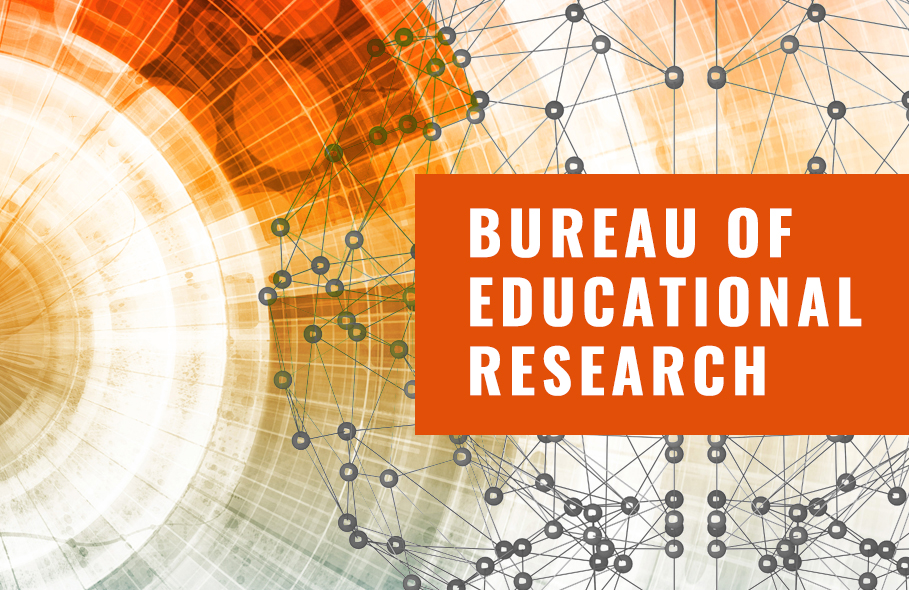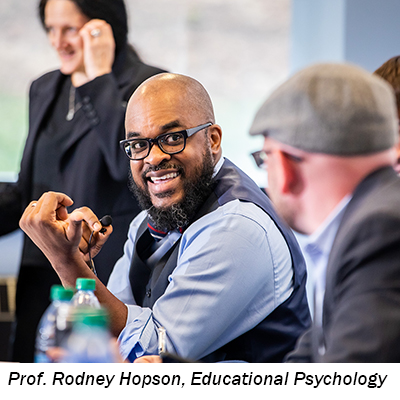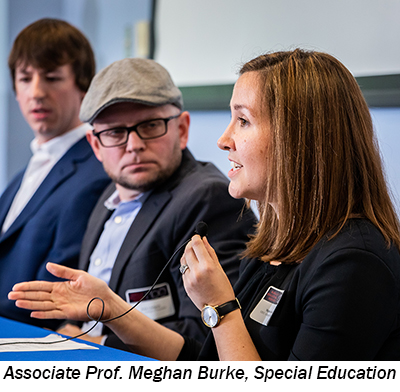The Bureau of Educational Research: Ready for the Future
by Tom Hanlon / Oct 25, 2019

“In the next 100 years, we’re going to see education have a much greater impact across many fields. Education will not just impact its own field, but fields like medicine, social sciences, artificial intelligence, and so on. And collaborations are going to fuel and enable that impact.” — Gabrielle Allen, Associate Dean for Research and Research Education
At its 100-year mark, the Bureau of Educational Research in the College of Education can look back with pride on the significant impact it has had in education across the state and the nation.
“The vision coming out of the College, enabled by the bureau, is thinking about how you build this structure that supports research and also connects you to civic engagement and social impact,” Gabrielle Allen, associate dean for research and research education, says. “Just as on the engineering side of campus we see a lot of technology entrepreneurship and spin-off activities coming from that, we’re starting to see the same things here in education. How do we do apply research, how do we bridge the research so it can both be driven by and address the challenges that we see in schools and in higher education and in companies?”
Collaborating Across Campus
Fouad Abd-El-Khalick was a faculty member of the College of Education from 2000 to 2016, led Curriculum and Instruction from 2012 to 2015, and led the Bureau of Educational Research from 2014-2016; he is now dean of the School of Education at the University of North Carolina. He returned to campus in September to celebrate the BER’s centennial and take part in a panel discussion about the bureau’s history and its future.
“Time after time, leader after leader, this bureau has been able to respond to the changing epochs in educational research,” Abd-El-Khalick says. “When I got my first grant here, there were very few in the College who were reaching out across campus to collaborate. Now, we’re sitting at the table with engineers, with scientists, with people in business, all under the auspices of the Bureau of Educational Research, talking about the next big grant. That has been a major shift for us. It’s become ‘How can I build strategic relationships across campus?’ The bureau has gotten us to go out into the world of funding, to be a builder of research, to reach out into campus.”  The idea of interdisciplinary work is not new, says Rodney Hopson, a professor in Educational Psychology, but the questions have changed. “I’m beginning my third decade of teaching at the university level. I have had experience with the University of Virginia, Curry School, Bureau of Educational Research, and am used to a bureau that serves to shape and act as a catalyst for my own academic training and intersectional collaborations,” he says. “Thanks to the support of the staff and leadership of this bureau, it serves in a role to catalyze, to bring connections across disciplines and spaces.”
The idea of interdisciplinary work is not new, says Rodney Hopson, a professor in Educational Psychology, but the questions have changed. “I’m beginning my third decade of teaching at the university level. I have had experience with the University of Virginia, Curry School, Bureau of Educational Research, and am used to a bureau that serves to shape and act as a catalyst for my own academic training and intersectional collaborations,” he says. “Thanks to the support of the staff and leadership of this bureau, it serves in a role to catalyze, to bring connections across disciplines and spaces.”
Those connections, says Meghan Burke, could eventually spawn a research center to facilitate interdisciplinary research on disability. “You could have a center where you could be able to have those cross-interdisciplinary dialogues and really try to develop something outside the box,” says Burke, an associate professor in Special Education. “We have a Department of Special Education that’s been known for decades for its important and innovative research. We have different departments that could be part of something like that. It doesn’t have to be just in disability; it could involve technology, for example. To be able to have the infrastructure of a center would be really critical in moving forward.”
 Robb Lindgren points to the IDEALL lab (Illinois Digital Ecologies and Learning Laboratory) as a prime example of critical infrastructure being built in the College for interdisciplinary research. “We have the credibility here at Illinois to not just speculate about what would be good, but to even brag a little,” says Lindgren, a professor in Curriculum & Instruction. “We built some of these infrastructure tools that we think can allow the researchers who are here and future researchers to do powerful things. The IDEALL lab is the most obvious example of that. We built that lab, not as a tool for one faculty member to do precisely the research that they want to do, which is often what happens in universities, but here we built something that was meant to be used by people across this college and even by people across this campus."
Robb Lindgren points to the IDEALL lab (Illinois Digital Ecologies and Learning Laboratory) as a prime example of critical infrastructure being built in the College for interdisciplinary research. “We have the credibility here at Illinois to not just speculate about what would be good, but to even brag a little,” says Lindgren, a professor in Curriculum & Instruction. “We built some of these infrastructure tools that we think can allow the researchers who are here and future researchers to do powerful things. The IDEALL lab is the most obvious example of that. We built that lab, not as a tool for one faculty member to do precisely the research that they want to do, which is often what happens in universities, but here we built something that was meant to be used by people across this college and even by people across this campus."
Challenges and Opportunities Inherent with Technology
Advancing technology ushers in both new challenges and opportunities. It can be a challenge to harness and effectively use the technology to advance learning, society, and quality of life—but when those challenges are met, the rewards can be great.
For example, Allen says, in the next 20 to 30 years, scientists will be able to understand and model the human brain on a computer. “I think we have to be ready for that in terms of what does that mean for the field of education.” she says. “How can we potentially model these educational processes and see on a computer what’s going to happen if you teach like this, how the brain will react? That’s huge.”
That is huge—and it’s also just the beginning. Allen is already seeing presentations on how robots are being taught using deep learning, a subset of machine learning in artificial intelligence. In deep learning, networks can learn while unsupervised, from data that is unstructured or unlabeled. “In education, we’re not just thinking about humans, but about robots and learning,” she says. “Along with that, we’re going to see our own brains will be augmented with additional hardware. We’re going to be able to record memories, we’re going to be able to process information, we’ll have access to any information, we’ll understand brain waves and transfer them into speech. We’re going to have to understand what that means for learning and how we can take advantage of that for learning.”
The College has fully embraced digital education—instruction and learning that relies on the effective use of technology—and that embrace will only grow tighter. “As we talk about digital education, we’re talking about preparing the next generation for the digital age that’s coming at them at breakneck speed,” says Dean James D. Anderson. “How do we use digital education to help our young talent develop the skills that are necessary for the new economy, and develop them in a much more systemic kind of way?”
TIER-ED—the Technology Innovations in Educational Research and Design— is one of multiple research initiatives in the College that will address those and similar questions. TIER-ED examines how new technologies can be used to address the most critical problems in education.
Significant Changes Coming in Education
In both the near and distant future, education will undergo significant changes. Student demographics are changing, with many more students returning to college or coming to higher education for the first time at a later age. And that will ramp up, as will the concept and reality of lifelong learning—particularly as medical advancements lead to longer lives.
“We have 40,000 MOOC students, and what percent of our doctoral students are online students?” says Bill Cope, a professor in Education Policy, Organization & Leadership. “The ground is shifting under what we do on a daily basis. The way these students need to be served is fundamentally different from our historical practices. We’re on the cusp of this huge change, and our College is a huge leader, a national leader in this area.”
“The nature of our work is going to be changing,” Allen adds. “We’ve already seen major companies like Amazon and Google set up their own internal universities. We’re going to see much more attention not just to lifelong learning, but to different educational models. Education may fundamentally change.”
Last year, the College of Education was able to recruit Hopson, an evaluation methodologist, through the President’s Distinguished Faculty Hiring Program. “We are fortunate at Illinois to have a legacy that has served as an archival hub for scholars in evaluation and evaluation research for the last 50-plus years in the Department of Educational Psychology and the QUERIES unit,” he says. “Bureaus evolve. That’s part of their reality. New ideas emerge, new spaces and infrastructures emerge. There’s a torch and a baton to pass. I look forward to the evolving nature of what the bureau will become, and being one of the ones to pass batons to another generation of educational evaluators and researchers.”